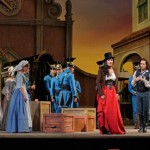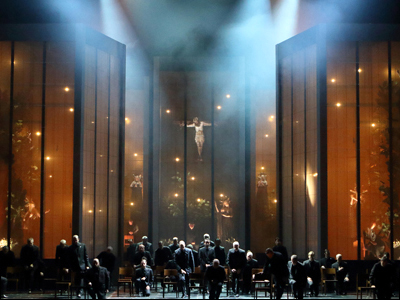 By Rebecca Schmid
By Rebecca Schmid
Many American opera-goers, including New Yorkers, look across the ocean and wish that their home institutions would afford themselves the same liberties of programming. Back in Berlin, the Deutsche Oper kicked off its season with a Lachenmann opera, Das Mädchen mit den Schwefelhölzern, while the Komische Oper launched a Monteverdi trilogy including themed culinary experiences during intermission, devised by the new Intendant Barrie Kosky. Anyone steeped in bel canto might be secretly happy to spend his or her time otherwise, melody being as foreign to Lachenmann as plot is to the tradition of Regietheater. But the opening production of the Metropolitan Opera this season, L’Elisir d’Amore (seen September 27), sadly reaffirms the stereotype that even this country’s leading companies are often content to rehash well-known repertory in not so inspired packages.
The director Bartlett Sher, who recently presided over Nico Muhly’s Dark Sisters at English National Opera, attempts to go against the grain by positing Donizetti’s opera as an allegory for the Risorgimento. Sergeant Belcore and his soldiers represent the Austrians, while the peasant Nemorino and the beautiful landowner Adina must hold to their Italian territory. This is at least what the program notes tell us, all the more convincing given that the love potion which Nemorino falsely believes has allowed him to win over the heart of Adina is nothing more than a bottle of red wine. Yet the production concept fails to materialize with depth and stalls an inherently humorous, light hearted opera.
The star of the production is of course not Sher but Anna Netrebko, the Met’s official poster child who opened last season in another Donizetti opera, Anna Bolena. Her reappearance this year in a top hat failed to distract from the fact that bel canto operas are not an ideal vehicle for her vocal skills. The Russian soprano’s timbre has only become rounder and richer in recent years, and her personality naturally lends itself to the role of the flirty Adina, yet her Italian diction is largely incomprehensible and her mastery of coloratura still subpar. It was refreshing to see the American tenor Matthew Polenzani in the spotlight as Nemorino, albeit in a more earnest than buffo portrayal. He briefly stopped the show in a soulful account his romanza “Una furtiva lagrima,” demonstrating fine use of messa di voce.
Mariusz Kwiecien possesses a tough, gallant baritone that suited Sher’s vision of Belcore, yet it was Ambrogio Maestri who brought the heaviest of dose of authenticity—and humor—in the role of Doctor Dulcamara, distributor of the love potion. One of the most memorable moments in the opera occurs in his barcarolle with Adina at the start of the second act, in which Dulcamara portrays a rich senator. The contrast of Maestri’s old school inflections with Netrebko’s hammed up acting was especially prominent here, although they both appeared to be having a good time onstage. Rounding out the cast in the role of the peasant girl Gianetta was the lyric soprano Anne-Carolyn Bird, whose nasal timbre and studied acting did little to enhance what was largely an under inspired evening.
The orchestra of the Metropolitan Opera performed with natural verve and flexible phrasing under Maurizio Benini, although the Italian conductor was a bit too eager to keep the energy high with fleet tempi. The Met’s chorus did not deviate from its high standards as the peasants surrounding Adina and Belcore’s platoon. Naturalist sets by Michael Yeargan aimed for a larger-than-life, rustic charm that gained aesthetic appeal in the pastel buildings of the village square scene in the first act, while the painted haystacks lining Adina’s farmhouse in the second act indicated a bland attempt to reinvent this familiar opera in bold, accessible strokes. Costumes by Catherine Zuber, ranging from frilly peasant dresses to Austrian soldiers’ uniforms, were well-crafted but not particularly memorable. Top hats for Adina and Dulcamara added perplexing, out of place flash. While there is no doubt that Lincoln Center remains a center of world-class opera, even with the remains of New York City Opera roaming the streets, it may not be enough to ride on big names and crowd pleasers if the Met is to live up to its name as an unrivalled bastion of quality.
Wordless Music
A visit to New York would of course not be complete without a venture into the thriving homegrown culture of indie classical. The Wordless Music Orchestra, founded in 2006 by Ronen Givony, has won attention for bringing together musicians who specialize in contemporary repertoire with rock artists such as Johnny Greenwood of Radiohead and the Japanese band MONO. On September 22, the Met Museum presented the orchestra in arrangements of songs by the Danish trio Efterklang, whose new album Piramida was released three days later. The concert boasted a strong representation of what a friend was quick to identify as hipsters, i.e. younger listeners who would most likely not venture outside their borough for a formal event at Lincoln Center. Orchestration by Karsten Fundal and Missy Mazzoli added ethereal textures to the cool vocals and ambient electronica of Efterklang, described by NPR as lying “somewhere between the cooing gloom of Bon Iver…and the soaring grandiosity of Coldplay.” A trio of female vocalists, led by Katinka Fogh Vindelev, added another layer of atmospherics, while lead singer Casper Clausen brought a friendly, casual presence to the stage.
The atmosphere took a decidedly more pop-rock direction when Clausen asked the audience to stand up for the last two numbers. Among the encores was a reprisal of “The Ghost,” a rhythmically catchy number to which Mazzoli added inventive, rubbery textures in the strings. Fundal had arranged the bulk of the songs, with a range of success. Tremoli in the slow medley “Sedna” met powerfully with vocal wailing and live electronica, while the scurrying violins were drowned out by the drums and electronica toward the end of “Between the Walls.” Despite such moments, Efterklang’s meditative, rock-inflected vibes were only enhanced in the collaboration with classical musicians. The flutes in “Told to be fine,” also entrusted to Fundal, added a heavenly sheen. The result may lack the mental rigor classical listeners associate with everyone from Bach to Lachenmann, but if blending popular and classical idioms can be such good listening, why spend one’s time otherwise?

